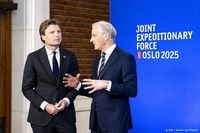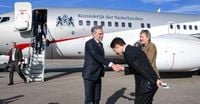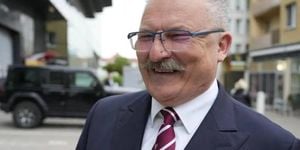On May 9, 2025, tensions surrounding Russia's military activities were highlighted by Dutch Defense Minister Ruben Brekelmans, who criticized the country for attempting to promote imperialism through a grand military parade in Moscow. As Russia celebrated the 80th anniversary of its victory over Nazi Germany, Brekelmans chose to attend a summit of North European countries in Oslo, emphasizing the importance of solidarity among allies in strengthening freedom in Europe.
Brekelmans remarked, "Today is a very important day, and the contrast could not be greater," referring to the stark differences between the military display in Moscow and the collaborative efforts in Oslo. The Kremlin's propaganda equates its current conflict with Ukraine to the fight against the Nazis, labeling Ukraine and its Western allies as the new oppressors. This narrative has been a central theme in Russia's rhetoric since the invasion of Ukraine began.
During the summit, Brekelmans's comments were echoed by Dutch Prime Minister Dick Schoof, who expressed concerns about Russia's increasing military presence near the Finnish border. Schoof warned that within two to three years, Russia could potentially amass a significant troop force capable of initiating another conflict in Europe. He made these statements during the Joint Expeditionary Force (JEF) summit, which took place in Oslo, where leaders from several North European nations gathered to discuss regional security.
Schoof's warning stems from observable Russian military activities, including the construction of new railway connections and a military headquarters near Norway's border. He stated, "In a few years, Russia has developed enough capacity to potentially start another war, and that could very well be on the European continent." This alarming prediction reflects the growing apprehension among European leaders regarding Russia's ambitions.
The JEF, a military alliance comprising the three Scandinavian countries, Finland, the three Baltic states, Iceland, the United Kingdom, and the Netherlands, aims to bolster defense in Northern Europe and support NATO operations in the region. The collaboration is increasingly critical as concerns about Russian aggression continue to rise.
Earlier in the week, Defense Minister Brekelmans had also voiced similar apprehensions during his King's Day lecture, where he highlighted Russian President Vladimir Putin's aspirations to restore Russia's influence to pre-1989 levels. Brekelmans pointed out that the Russian war industry is operating at full capacity, with thousands of additional soldiers being recruited—far more than what is necessary for operations in Ukraine alone.
According to the Military Intelligence and Security Service (MIVD), should a ceasefire occur in Ukraine, Russia would only require a year to reposition its troops for a large-scale offensive, potentially targeting the Baltic states. This intelligence underscores the urgency of the discussions taking place among the JEF member nations.
The juxtaposition of the military parade in Moscow and the summit in Oslo serves as a stark reminder of the current geopolitical climate. While Russia showcases its military might, leaders in Northern Europe are working collaboratively to ensure stability and security in the face of growing threats.
Brekelmans's presence in Oslo rather than Moscow is a symbolic gesture, reflecting a commitment to collective defense and cooperation among European allies. As tensions escalate, the importance of such unity cannot be overstated.
As the situation continues to unfold, the international community watches closely, aware that the implications of Russia's actions extend beyond its borders. The potential for conflict in Europe remains a pressing concern, and the responses from NATO and allied nations will be crucial in shaping the future of regional security.
The events of May 9, 2025, serve as a pivotal moment in the ongoing discourse about European defense and the necessity of preparedness against potential aggression. With leaders like Brekelmans and Schoof at the helm, there is hope that a coordinated effort can deter further escalation and promote peace in the region.





